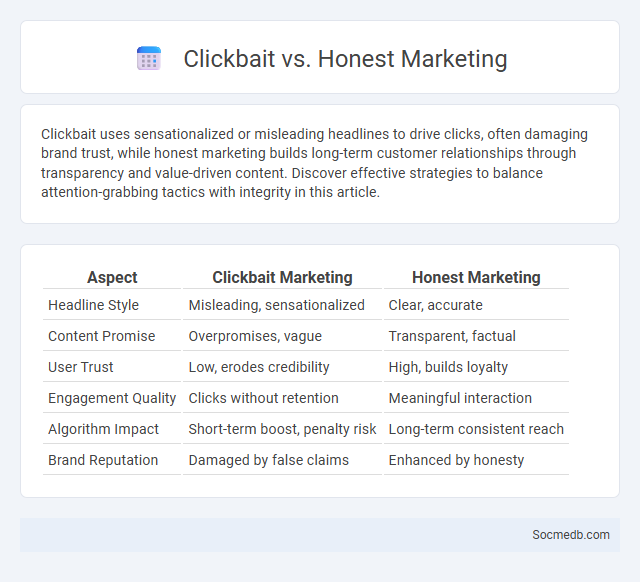
Photo illustration: Clickbait vs honest marketing
Clickbait uses sensationalized or misleading headlines to drive clicks, often damaging brand trust, while honest marketing builds long-term customer relationships through transparency and value-driven content. Discover effective strategies to balance attention-grabbing tactics with integrity in this article.
Table of Comparison
| Aspect | Clickbait Marketing | Honest Marketing |
|---|---|---|
| Headline Style | Misleading, sensationalized | Clear, accurate |
| Content Promise | Overpromises, vague | Transparent, factual |
| User Trust | Low, erodes credibility | High, builds loyalty |
| Engagement Quality | Clicks without retention | Meaningful interaction |
| Algorithm Impact | Short-term boost, penalty risk | Long-term consistent reach |
| Brand Reputation | Damaged by false claims | Enhanced by honesty |
Understanding Clickbait: Definition and Tactics
Clickbait refers to sensationalized or misleading headlines designed to attract clicks and increase web traffic by exploiting curiosity gaps. Common tactics include using exaggerated claims, provocative questions, and emotional triggers that compel users to engage with the content. Understanding clickbait helps users develop critical thinking skills to discern genuine information from manipulative digital marketing strategies.
Defining Honest Marketing: Principles and Practices
Honest marketing relies on transparent communication, accurate representation of products or services, and ethical engagement with customers to build trust and credibility. Core principles include avoiding misleading claims, respecting consumer privacy, and providing genuine value through authentic content and consistent messaging. Your brand's commitment to honesty fosters loyal relationships and long-term business success in the dynamic social media landscape.
The Rise and Impact of Clickbait in Digital Media
Clickbait has surged in digital media, exploiting curiosity gaps with sensational headlines to boost click-through rates and ad revenue. Platforms like Facebook and YouTube have witnessed significant algorithmic shifts favoring engagement, which inadvertently amplifies clickbait content. This trend undermines content quality, erodes user trust, and challenges digital media ethics by prioritizing virality over informative value.
Key Differences: Clickbait vs Honest Marketing
Clickbait relies on sensational headlines and exaggerated claims to generate quick clicks, often leading to misleading or disappointing content, whereas honest marketing prioritizes transparency and builds long-term trust with your audience through authentic messaging. Clickbait may boost short-term engagement but damages brand reputation, while honest marketing fosters loyal followers and sustainable growth. Understanding these key differences helps you create social media strategies that balance attracting attention with maintaining credibility.
Psychological Triggers Behind Clickbait and Honest Marketing
Psychological triggers behind clickbait exploit curiosity gaps, urgency, and emotional appeal to drive clicks but often lead to disappointment and mistrust. Honest marketing leverages transparency, value-driven content, and authentic engagement to build long-term brand loyalty and trust with your audience. Understanding these contrasting approaches helps you create effective social media strategies that foster genuine connections and sustained growth.
Effects on Consumer Trust and Brand Reputation
Social media significantly influences consumer trust and brand reputation through user-generated reviews, real-time interactions, and viral content sharing. Negative feedback or misinformation can rapidly damage your brand's credibility, while consistent positive engagement fosters trust and loyalty. Monitoring social media sentiment and addressing customer concerns promptly are essential strategies for protecting and enhancing your brand's reputation.
SEO Implications: Clickbait vs Honest Marketing Content
Social media strategies impact SEO by influencing user engagement metrics such as click-through rate, bounce rate, and dwell time, which search engines monitor for ranking signals. Clickbait content often generates initial spikes in traffic but leads to high bounce rates and diminished trust, negatively affecting long-term SEO performance. Honest marketing content fosters sustained user interaction and brand authority, improving backlink acquisition and keyword relevance that boost search engine rankings.
Best Practices for Ethical, Effective Marketing
Implement transparent communication by clearly disclosing sponsored content and respecting user privacy to build trust and comply with regulations. Utilize authentic engagement strategies, such as responding to comments and fostering community interaction, to enhance brand loyalty and credibility. Regularly analyze campaign data to optimize content relevance and ensure marketing efforts align with ethical standards and audience expectations.
Case Studies: Successes and Failures
Case studies on social media reveal that brands like Nike and Starbucks achieved significant engagement and brand loyalty through targeted campaigns using user-generated content and influencer partnerships. In contrast, failures such as Pepsi's 2017 ad backlash highlight the risks of insensitive messaging leading to public outrage and damaged reputations. Analyzing these cases demonstrates the importance of authentic communication and cultural awareness in social media strategy.
Choosing the Right Approach for Lasting Results
Selecting the right social media strategy hinges on understanding target audience behavior, platform algorithms, and content relevance to foster genuine engagement and brand loyalty. Consistent analysis of key performance indicators such as reach, impressions, and conversion rates ensures optimization and sustainable growth. Tailoring content to platform-specific trends and user preferences maximizes long-term impact and return on investment.
 socmedb.com
socmedb.com